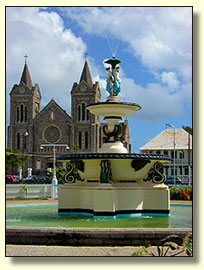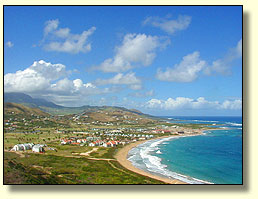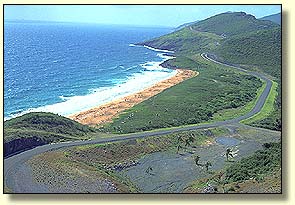
St. Kitts & Nevis
Original Official Site of the
St. Kitts & Nevis
Department of Tourism
Exploring
St. Kitts | Exploring
Nevis
Exploring St. Kitts:
Basseterre
Basseterre, set against the irresistible backdrop of St. Kitts'
emerald green hills and punctuated by elegant Georgian architecture,
is one of the best of the Caribbean's small capitals.
Old Road Bay
It was here at Old Road Bay that Sir Thomas Warner, along with
his family and 14 others, began the first permanent European
settlement in the Leeward Islands. The settlers were at first
on good terms with the island's Carib inhabitants, though such
friendship lasted only a very few years. Rather than cultivating
sugar, it was tobacco that had drawn Warner to the island, and
it was the island's tobacco crop that first supported the settlement.
The Warner family estate served as the capital of St. Kitts
until 1727, when it was moved to Basseterre. Outside of Old Road
bay are found a number of interesting Carib petroglyphs.
Sandy Point
This second largest of St. Kitts' towns occupies the very spot
on which Thomas Warner and his small party made landfall in 1623.
During the 17th century Sandy Point was the center of the island's
tobacco trade, and among Sandy Point's most fascinating sights
are the large tobacco warehouses constructed during that time
by the Dutch West India Company.
Frigate Bay Peninsula

Frigate Bay Peninsula stretches like the neck of an upturned
wine bottle, connecting the main body of St. Kitts to the widened
tip of the bottle's mouth at the Southeast Peninsula. One side
of that neck--the dramatic windward beach at North Frigate Bay,
is battered dramatically by the Atlantic surf. On the leeward
side, the beach is met by the calm Caribbean waters of Frigate
Bay.
Wingfield Estate and
Petroglyphs
For hundreds of years before European navigators arrived in
the Caribbean, the island's Carib community lived on this beautiful
site. Three years after the first European settlers arrived,
the Caribs were all but annihilated at Bloody Point. At the edge
of the estate, standing as mute witness to the island's ancient,
pre-Columbian history, is a cluster of large boulders marked
heavily with petroglyphic symbols and human figures. Liamuiga,
or 'fertile land,' was the Carib name for the island; in the
1980s, that name was given to St. Kitts' central mountain, a
lush, 3792-ft volcanic peak known during the colonial period
as Mount Misery.
Southeast
Peninsula

At the Southeast Peninsula the narrow neck of Frigate Bay Peninsula
broadens to a wide, undulating plain that contains some of the
island's most stunning natural features. There are nine unspoiled
beaches and lagoons here, as well as the eye-popping pink salt
pond--its color comes from its innumerable, miniscule krill shrimp.
This protected wilderness area is also populated abundantly by
tropical birds, as well as by white-tailed deer and black-faced
vervet monkeys.
St. Thomas Church
In the yard of this modest church is the tomb of Sir Thomas
Warner, the leading figure in the island's colonial history.
The memorial itself is a fascinating object, replete with a finely
engraved Elizabethan epitaph to the 'much lamented gent.' Warner,
who earned his knighthood as a colonizer of St. Kitts and a number
of other islands, died in 1648. St. Thomas is located in Middle
Island, which followed upon the establishment of the island's
plantations as St. Kitts' first European village.
More
of St. Kitts | Exploring
Nevis
Click here to
see what visitors are saying about interesting places in St.
Kitts & Nevis.

| St.
Kitts & Nevis Home Page | History & Culture | Admiral
Horatio Nelson | Points
of Interest | Brimstone
Hill Fortress | Basseterre | Nevis | Charlestown | Beaches | Activities | Diving | Fishing & Boating | Golfing | Eco-Adventures | Travel
Tips | Transportation | Accommodations | Restaurants & Nightlife | Calendar
of Events | Destination
Specialists | Best
Bets | Tourist
Offices | Geographia |

This page, and all contents of this
Web site are Copyright (c) 1996-2008
by interKnowledge Corp. All rights reserved. |

